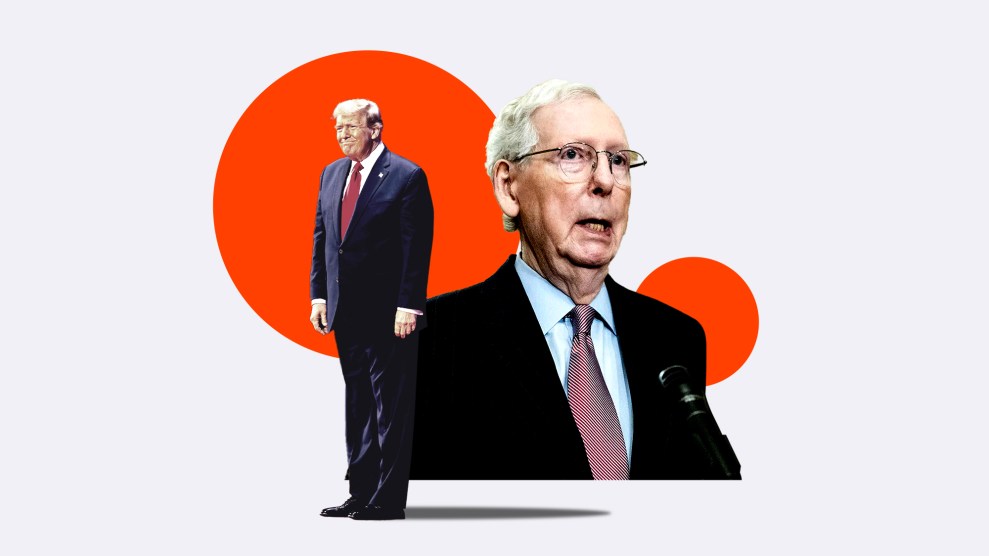
Mother Jones illustration; Michael Brochstein/ZUMA; Annabelle Gordon/CNP/ZUMA
The last big thing Mitch McConnell did as the Senate Republican leader will likely be remembered as one of his most consequential—his decision in early 2021 not to hold Donald Trump accountable for the January 6 insurrection. At the time, McConnell was in a unique position to end Trump’s political career. But McConnell, who announced Wednesday that he will step down from his leadership post in November, was too afraid to try.
If a two-thirds majority in the Senate had convicted Trump after he was impeached for inciting the attack on the US Capitol, lawmakers likely could have disqualified him from ever holding public office again. If they’d done so, Trump would not now be the presumptive Republican nominee with a good chance of retaking the presidency. And if there’s one person who saw that danger and had a chance at stopping it, it was McConnell. Yet when the time came, McConnell voted to acquit.
“There’s no question, none, that President Trump is practically and morally responsible for provoking the events of the day,” McConnell said in a speech following his vote. But, he said, he didn’t think he had the authority to convict Trump because Trump had already left office. It was a transparent excuse to take the easy way out and kick responsibility for protecting American democracy from himself to the courts—which he knew full well might not be up to the task. Nonetheless, seven other Republican senators voted to convict Trump. If McConnell had summoned the courage to join them, he would have needed to drum up nine more GOP votes to convict. But McConnell—whose parliamentary skills will make him one of the most consequential majority leaders ever—didn’t even try. And for what? He’s spent the last three years in the minority, only to step down just when Republicans might finally win back full control of the White House and Congress.
There are plenty of people who are responsible for the perilous state of American democracy. But perhaps right after Trump is McConnell himself. He is responsible for the 6-3 right-wing majority on the Supreme Court that overturned Roe v. Wade, created by blocking President Barack Obama’s Supreme Court nominee, Merrick Garland, for nearly a year so that Trump could instead fill the vacancy. McConnell then rushed to fill another vacancy in the weeks before the 2020 election, shamelessly contradicting his own justification for blocking Garland. His maneuvering led directly to the Dobbs decision, an unprecedented rollback of Americans’ civil liberties that ended the right to abortion.
McConnell was clear-eyed about what role that the courts, and above all the Supreme Court, would play in enacting his party’s agenda, and he worked diligently to fill the bench with radical judges. As expected, the courts are now enacting that agenda, which imposes religion upon everyone, erodes civil rights and environmental regulation, and diminishes the power of government to enact policies that GOP-appointed jurists don’t like.
It’s a remarkable legacy of significant destruction that will continue long after McConnell has stepped down. McConnell may not want Trump to return to the White House, but even so, a Trump victory in November would define McConnell’s legacy.

















